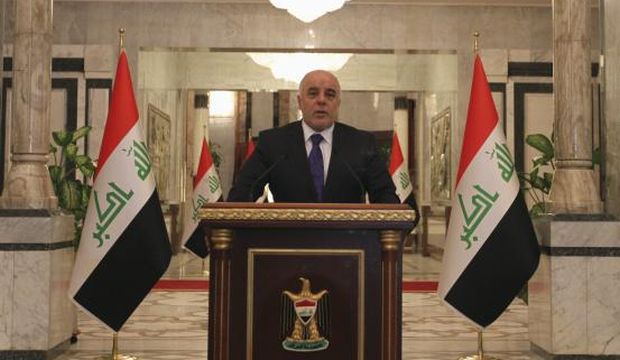
Iraq’s Prime Minister-designate Haider Al-Abadi speaks during a news conference in Baghdad on August 25, 2014. (Reuters/Mahmoud Raouf Mahmoud)
Baghdad, Asharq Al-Awsat—Iraqi Prime Minister Haider Al-Abadi on Wednesday defended the decision to refer a draft law creating a military National Guard force to parliament for ratification, saying its was part of his government’s efforts to fight the Islamic State of Iraq and Syria (ISIS).
Abadi’s comments came amid criticism of the move from Iraqi parties, along with another controversial draft law dubbed the “Justice and Accountability Law” which amends the country’s de-Ba’athification legislation.
“The cabinet voted to send the National Guard draft law and the Justice and Accountability draft law to parliament for ratification based on our commitment to the government program and its implementation within the declared time-frame,” Prime Minister Abadi said in a speech on Wednesday.
Abadi had earlier pledged to oversee the formation of a National Guard force to assist in the fight against ISIS within six months, with many observers now expecting the new military force to be established much sooner.
The new force is intended to be locally-based and answerable to local provincial governments, in a bid to allay fears among Sunni Arabs of police and army troops commanded by the federal government in Baghdad.
“The atmosphere within parliament is well-disposed towards passing the National Guard law due to a sort of pre-agreement between the various political bloc leaders,” MP Shaalan Al-Karim told Asharq Al-Awsat.
However Karim, a member of the Wataniya bloc and an MP for Nineveh province, large parts of which remain under ISIS control, warned that the Justice and Accountability law would face a more difficult path.
The current draft of the law, which aims to amend Iraq’s de-Ba’athification measures, has been criticized by some parties as being too lax, they fear it will allow former senior officials responsible for human rights abuses during the rule of Saddam Hussein back into government. Sunni members of Abadi’s cabinet have also refused to consider the bill, claiming that it does not go far enough in easing restrictions.
However, both measures are seen as key to attempts to reconcile Iraq’s Sunnis with the federal government in Baghdad, which has been accused of pursuing sectarian agendas that have alienated many Iraqis and allowed ISIS to gain ground in Sunni-majority provinces.
“The National Guard law and the Justice and Accountability law are part of the legislation that was previously agreed on as part of the political agreement between Iraq’s parties [to form the Abadi government],” Karim added.
“These two laws are very important because they are part of the National Reconciliation project,” he told Asharq Al-Awsat.
